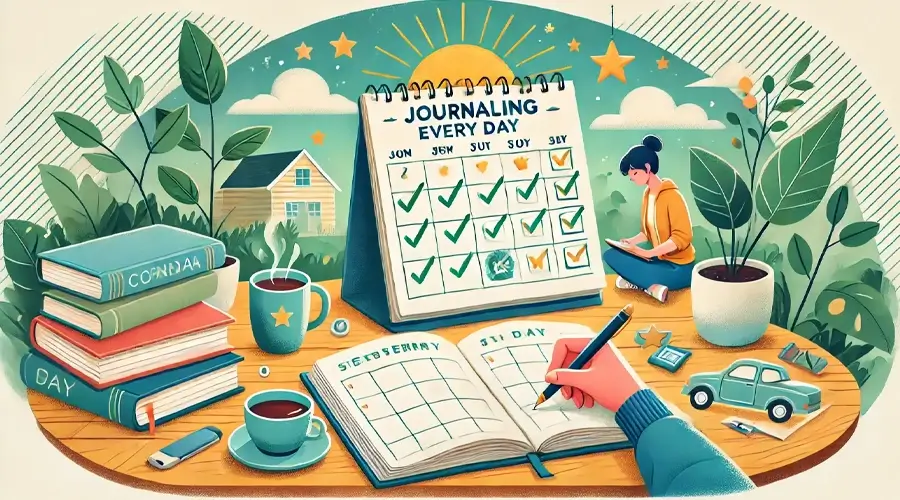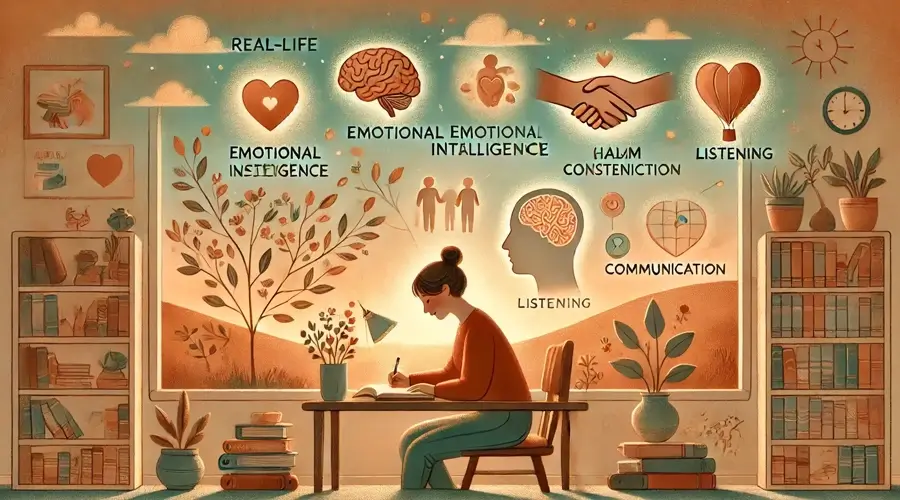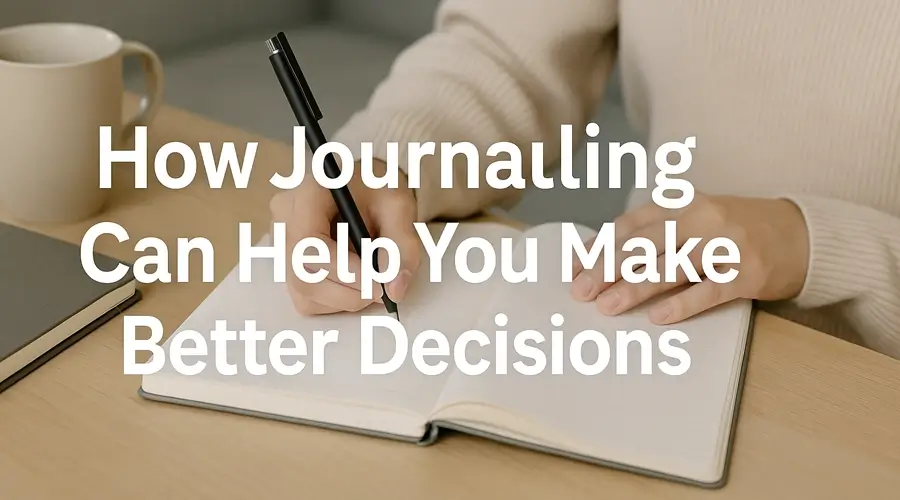Ever felt a wave of emotion hit you out of nowhere — frustration, anxiety, maybe even joy — but couldn’t quite name it or explain why it was there? You’re not alone. For many of us navigating the chaos of adulthood, understanding our inner world feels like trying to read a book with no punctuation — messy, confusing, and hard to follow.
This is where the powerful connection between journaling and emotional intelligence comes in.
In a time where mental clarity is often buried under to-do lists and digital distractions, journaling offers a quiet space to pause, process, and reflect. It’s not just about keeping a diary or documenting your day — it’s about creating emotional clarity. Writing things down helps you slow your thoughts, identify emotional patterns, and ultimately build the skills that form the foundation of emotional intelligence.
And what are the real emotional intelligence benefits? More than just a buzzword, emotional intelligence is what allows us to navigate relationships gracefully, make thoughtful decisions under pressure, and stay grounded in overwhelming situations. It’s the superpower behind confident communication, healthy boundaries, and self-trust.
By the end of this article, you’ll discover exactly how to use journaling as a practical tool to strengthen your emotional intelligence — not in theory, but in real, everyday life. Ready to stop guessing what you’re feeling and start truly understanding yourself? Let’s dive in.
We often hear about emotional intelligence (EQ) in psychology books or TED Talks — but in the real world, what does it actually look like?
It’s the quiet pause before snapping at your partner during an argument.
It’s noticing that a coworker’s sarcasm hides stress, not hostility.
It’s choosing to take a walk instead of doom-scrolling when you’re overwhelmed.
Emotional intelligence isn’t about being endlessly calm or emotionally perfect. It’s about recognizing, understanding, and managing emotions — both your own and those of others — in ways that improve how you relate, lead, and live.
At its core, EQ is made up of four key skills:
-
Self-awareness: The ability to recognize what you’re feeling and why you’re feeling it.
-
Emotional regulation: The skill to manage those emotions, especially under stress.
-
Empathy: Not just understanding someone else’s feelings, but feeling with them.
-
Social skills: Communicating clearly, handling conflict, and nurturing strong relationships.
Unlike IQ, which stays relatively fixed, EQ is something you can actively build — and that’s where journaling and emotional intelligence deeply intersect.
Through consistent journaling, you develop a deeper awareness of your emotional patterns, triggers, and blind spots. This self-reflection is the gateway to mastering emotional intelligence. And here’s the kicker: the emotional intelligence benefits ripple into almost every part of life.
For people in their 20s to 40s — navigating careers, relationships, and self-discovery — EQ often plays a bigger role in success than raw intellect. It’s the X-factor that helps you manage workplace dynamics, maintain healthy friendships, and grow through personal challenges without losing yourself in the process.
So, if you’ve ever felt emotionally “off” but couldn’t explain it, or struggled to connect with others despite your best efforts, it might not be about knowing more — but about feeling deeper. And journaling just might be the simplest, most powerful step you can take toward that.
How Journaling Fuels Emotional Intelligence — The Real Psychology Behind It
At its core, emotional intelligence begins with one powerful habit: self-awareness. And if there’s one tool that consistently deepens that awareness, it’s journaling.
When you put pen to paper — or fingertips to keyboard — something shifts. You move beyond the noise of the moment and into a space of reflection. You stop reacting and start noticing: What am I really feeling? Why did I react that way? Is there a pattern here? This simple act of slowing down and paying attention to your inner dialogue is where emotional growth begins.
From a neuroscience perspective, journaling and emotional intelligence are deeply connected. Writing activates the prefrontal cortex — the part of the brain responsible for reasoning and regulation. It helps create distance between you and your emotions, allowing you to observe them without being consumed by them. In psychology, this process is known as affect labeling — naming your emotions to tame them.
This is where the magic happens. When you write consistently, your brain starts to recognize emotional patterns — triggers that show up repeatedly, thought loops that sabotage your mood, and recurring beliefs that shape your responses. Over time, this kind of pattern recognition strengthens emotional regulation — the ability to respond intentionally rather than impulsively.
Journaling also gives you a private space to explore emotions you might not feel safe sharing aloud. It allows you to make meaning out of your experiences and understand not just what happened, but how it felt — and why that matters. That kind of insight is the very foundation of EQ.
So yes, the emotional intelligence benefits of journaling go far beyond stress relief or productivity hacks. It’s about rewiring your emotional habits from the inside out — one honest page at a time.
Real-World Benefits: What Happens When You Journal Consistently
Let’s get real — life doesn’t happen in a vacuum. We’re constantly dealing with shifting emotions, unexpected challenges, and messy human dynamics. That’s why consistent journaling isn’t just a “nice” self-care habit — it’s a game-changer for navigating everyday life with more clarity and less chaos.

When you journal regularly, the benefits sneak up on you in the best way. You start thinking more clearly, overreacting less, and connecting more deeply — with yourself and others. These aren’t vague promises; they’re real outcomes, shaped by the deep link between journaling and emotional intelligence.
Take this scenario: You’re going through a breakup. Your emotions are all over the place — anger, sadness, confusion. Without journaling, those feelings stay jumbled and leak into other parts of your life. But when you sit down and write, you begin to untangle the mess. You identify the emotional triggers, recognize your role in the relationship dynamics, and find closure — not by forgetting, but by understanding.
Or think about a typical workday. Your manager criticizes your presentation. Without EQ, you spiral — stress, self-doubt, resentment. But if you’ve built a habit of journaling, you’re more likely to pause, reflect, and process. “Why did that comment bother me so much?” “Was there truth in the feedback?” This practice of honest self-inquiry leads to better responses — not just reactions.
Even in the smallest moments — like feeling annoyed at a family dinner or drained after scrolling social media — journaling helps you notice what’s happening under the surface. Over time, this builds emotional resilience and reduces the need to numb out or lash out.
These real-world shifts are exactly why the emotional intelligence benefits of journaling matter. They’re not about becoming someone else — they’re about becoming more of yourself, with clarity and control.
So, if you’ve ever wondered whether journaling is “doing anything,” take a look at how you’re handling life these days. Chances are, you’re already showing signs of emotional growth — one page at a time.
The Resistance Is Real: Why Journaling Feels Hard Sometimes
Let’s be honest — journaling isn’t always easy. For something that requires nothing more than a pen and a quiet moment, it can stir up surprising amounts of discomfort.
You sit down, open the page, and… nothing. Your mind goes blank.
Or maybe it’s not blank — maybe it’s racing with thoughts — but you’re unsure where to begin.
“I don’t know what to write.”
“I’m not a good writer.”
“This feels weird.”
These are not just surface-level excuses. They’re signals of deeper emotional resistance. Often, the hardest part of journaling isn’t the act of writing — it’s what you might uncover in the process.
There’s a quiet fear in confronting your real feelings. What if you discover you’re more anxious than you thought? Or angrier? Or sadder? Journaling and emotional intelligence go hand in hand because both ask you to be radically honest with yourself — and that honesty can be uncomfortable.
But here’s the good news: You don’t have to write beautifully, and you don’t need to have all the answers. The point of journaling isn’t perfection — it’s permission. Permission to explore, feel, question, and reflect.
If writing a full page feels overwhelming, start with one sentence. Use prompts like:
-
“Right now, I feel…”
-
“Something that keeps looping in my mind is…”
-
“I don’t want to admit it, but…”
You can also try non-linear approaches like bullet journaling, mind-maps, or even voice notes if writing feels like too much. What matters most is emotional expression, not the method.
As your resistance softens, you’ll notice something powerful: you start to feel lighter. More honest. More aware. And that’s when the emotional intelligence benefits really begin to unfold — clearer self-understanding, better emotional regulation, and more authentic relationships.
Remember, the awkwardness is temporary. But the growth? That stays with you — long after the ink dries.
The Resistance Is Real: Why Journaling Feels Hard Sometimes
Journaling isn’t always easy. For something that requires nothing more than a pen and a quiet moment, it can stir up surprising amounts of discomfort.

You sit down, open the page, and… nothing. Your mind goes blank.
Or maybe it’s not blank — maybe it’s racing with thoughts — but you’re unsure where to begin.
“I don’t know what to write.”
“I’m not a good writer.”
“This feels weird.”
These are not just surface-level excuses. They’re signals of deeper emotional resistance. Often, the hardest part of journaling isn’t the act of writing — it’s what you might uncover in the process.
There’s a quiet fear in confronting your real feelings. What if you discover you’re more anxious than you thought? Or angrier? Or sadder? Journaling and emotional intelligence go hand in hand because both ask you to be radically honest with yourself — and that honesty can be uncomfortable.
But here’s the good news: You don’t have to write beautifully, and you don’t need to have all the answers. The point of journaling isn’t perfection — it’s permission. Permission to explore, feel, question, and reflect.
If writing a full page feels overwhelming, start with one sentence. Use prompts like:
-
“Right now, I feel…”
-
“Something that keeps looping in my mind is…”
-
“I don’t want to admit it, but…”
You can also try non-linear approaches like bullet journaling, mind-maps, or even voice notes if writing feels like too much. What matters most is emotional expression, not the method.
As your resistance softens, you’ll notice something powerful: you start to feel lighter. More honest. More aware. And that’s when the emotional intelligence benefits really begin to unfold — clearer self-understanding, better emotional regulation, and more authentic relationships.
Remember, the awkwardness is temporary. But the growth? That stays with you — long after the ink dries.
Simple Journaling Practices to Grow Your Emotional Intelligence
If the idea of journaling feels overwhelming, here’s some good news: it doesn’t have to be. Building emotional intelligence isn’t about writing a novel every night — it’s about creating small, consistent moments of self-connection.
Let’s start with a few low-pressure journaling methods that actually work:
-
Bullet Journaling: Short, structured notes. No full sentences required. Think: “Today I felt: [anxious, proud, distant]. Trigger: [meeting, phone call, memory].” This helps with emotional pattern recognition over time.
-
Morning Pages: Popularized by Julia Cameron, this involves writing three pages of stream-of-consciousness right after waking up. No filters, no edits. Just whatever is on your mind. It clears mental clutter and taps into deep emotional undercurrents.
-
Prompt-Based Journaling: Use questions to guide your reflection. Try prompts like:
-
“What emotion did I ignore today and why?”
-
“What’s one thing I need but haven’t asked for?”
-
“How did I show empathy this week?”
These prompts nurture self-awareness and emotional regulation, key components of EQ.
-

Now, let’s talk practical habits. Journaling becomes sustainable when you treat it as a ritual, not a task. Choose a consistent time — maybe five minutes before bed or right after your morning coffee. Find tools you enjoy: a beautiful notebook, your phone’s notes app, or even a digital journaling platform. Set the scene: dim light, calm music, a cozy chair. These small cues make a big difference.
But perhaps the most powerful practice is this: reflect without judgment.
So many of us stop journaling because we don’t like what we discover. We judge our thoughts, criticize our emotions, or feel ashamed of what we write. But emotional intelligence isn’t about being perfect — it’s about being real.
Let your journal be a space where everything is welcome — the mess, the confusion, the joy, the anger. That radical self-acceptance is the golden key to growing EQ. And over time, you’ll notice the emotional intelligence benefits showing up in unexpected places: calmer responses, deeper conversations, clearer boundaries.
With journaling and emotional intelligence, the goal isn’t to control your emotions — it’s to understand them. And when you do that, everything else begins to shift.
Conclusion: Let the Page Hold What You’re Not Ready to Say Out Loud
Journaling isn’t about crafting perfect sentences or sounding poetic — it’s about tuning in to the voice you often ignore: your own. In a world that constantly pulls your attention outward, the blank page quietly invites you inward. It holds space for messy thoughts, unspoken fears, subtle joys — the things you may not be ready to say out loud but still deserve to be seen.
The connection between journaling and emotional intelligence runs deep. Every honest entry strengthens your self-awareness, emotional regulation, and empathy — not just in theory, but in how you show up in everyday life. If you’re ready to experience the real emotional intelligence benefits for yourself, start today. Try using the Verbo AI app, a smart and intuitive space designed to guide your emotional journey through journaling — one reflection at a time.




